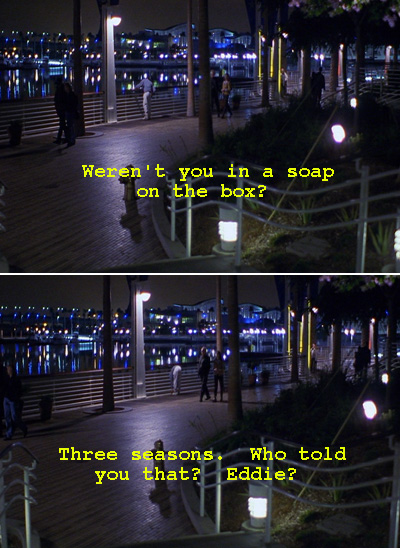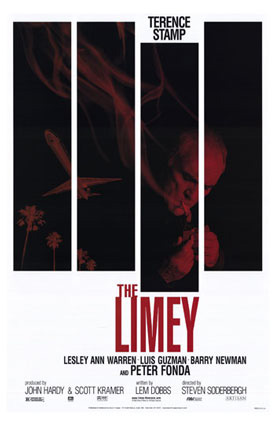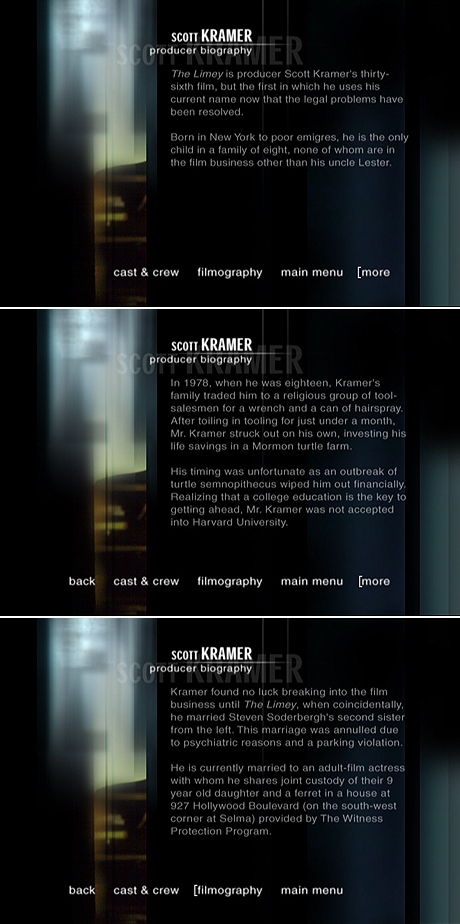

The award-winning drama "The Limey" was directed by Academy Award-winning director Steven Soderbergh. The production draft of the screenplay for the film, which was written by Lem Dobbs, includes an overt reference to Latter-day Saints.
In the production draft dated 08/03/98, the lead female character (Elaine) tells the lead male character (Wilson) that she starred in a TV series for three seasons, playing the part of a Latter-day Saint pioneer woman.
Elaine's exact words in the production script are: "Three seasons. They found that's the limit of human tolerance when it comes to following the adventures of a family of Mormons on the Chisum Trail. I was wife number three -- the ingenue."
The script was changed substantially by the time the film was finished, not just in this scene but throughout. One of the changes is that Elaine was on a simple soap opear rather than a series about Mormon pioneers. In the film, Wilson asks Elaine, "Weren't you in a soap on the box?"
Elaine answers, "Three seasons. Who told you that?"
Although it was in the screenplay, the Latter-day Saint reference has been completely excised from the film.
The DVD release of "The Limey" also features a Mormon reference. I don't know how the Mormon reference in the production script and in the actual DVD release are connected, but if there is no connection, this would be an unusual coincidence. In the Extra Features section, if one chooses the "Cast and Crew" section, among the crew members listed is producer Scott Kramer. Choosing this name yields a humorous fictional biography for Kramer. The second page of the Kramer biography states: "...Mr. Kramer struck out on his own, investing his life savings in a Mormon turtle farm."
In the production draft the section we have excerpted below has 743 words of spoken dialogue, compared to just 166 words of spoken dialogue in the actual film. This means the production draft for this section has four and a half times more dialogue than what ended up in the film.
Below is the section from the production draft of the screenplay, with the Latter-day Saint reference in red.
EXT. ELAINE'S APARTMENT BUILDING. EVENING.
Wilson gives up, starts to walk away. The gate BUZZES.
INT. ELAINE'S APARTMENT. EVENING.
Elaine opens the door. Wilson in the hall.
ELAINE
I was just going to toss some vegetable
rolls in the microwave, open a can of
diet soda.
(beat)
Want to take me out?
CUT.
INT. RESTAURANT. NIGHT.
Wilson and Elaine at a table.
WILSON
... No, I went in for more improving
pastimes. Philosophy classes, language
courses, European history, all that lark.
Did you know that in Paris in the
Eighteenth Century there were more rats
in people's houses than there were people
in people's houses.
ELAINE
Sounds like Beverly Hills.
WILSON
Here, are you always this sarky?
ELAINE
Sarcastic, moi? Maybe I'll mellow when
my ship comes in. It's expected any day
now. I'm all packed and ready to go.
WILSON
Weren't you on a television series?
ELAINE
(has he seen it?)
If it played in England somebody owes me
money. Who told you that -- Eddie?
WILSON
(yes)
Said it went on for donkey's years.
ELAINE
Three seasons. They found that's the
limit of human tolerance when it comes to
following the adventures of a family of
Mormons on the Chisum Trail.
(blinks coquettishly)
I was wife number three -- the ingenue.
WILSON
Oh, it just ended, then.
ELAINE
Now who's being sarcastic?
WILSON
When you've lost as many years as I have,
love, puts things in perspective, know
what I mean.
ELAINE
I'm sorry. I guess the rest of us have
no excuse for wondering where the time
went.
(raises her drink)
It must've been the bars.
Their food arrives.
ELAINE
It's a kind of prison, doing a series.
Early to bed, early to rise, no time off
for good behavior, you grab the boodle
for as long as it lasts.
(the kicker)
Only difference is you can't get arrested
afterwards.
Wilson appears fascinated by the cold glasses of water on the
table. Ice cubes CLINKING as he holds his. A BUSBOY
bringing them to other people, too, just like that, without
anyone even asking.
WILSON
I can't believe Jenny told you all that.
About me. She was always so embarrassed.
ELAINE
Not embarrassed.
WILSON
(correcting)
Ashamed.
ELAINE
Not ashamed.
Wilson looks at her. Okay. What then.
ELAINE
Disappointed.
WILSON
She never told Eddie, though.
ELAINE
She never told anyone else.
(making light now)
About the convict strain -- or is it
stain? No, I was privileged. I was
someone who helped Jenny efface her past.
WILSON
How'd you manage that, then.
ELAINE
When I'm not honing my craft in episodic
television I do double-duty as a voice
coach. Not that her accent would have
hobbled her progress. Not with that
look.
WILSON
Yeah, well, she started all that in
London.
ELAINE
Modelling.
WILSON
Learnin' 'ow to speak proper.
(putting it on a bit there.
Then, upper crust:)
Central School of Speech and Drama.
It's no doddle gettin' in there, y'know.
At seventeen. They offered her a place
at RADA n' all, only she'd've had to wait
till the next session and she was always
in hurry to get on, was Jenny. She could
talk posh without any training, when she
was knee-high to a grasshopper.
(indicating himself)
Show up the old man, you know.
Elaine smiles slightly. None of this information new to her.
But warming to this man.
ELAINE
You weren't disappointed in her, then.
WILSON
In Jenny? 'Course not. How could I be.
'Course I wasn't.
ELAINE
She was twenty-one when she came to me.
(looks at him)
... Straight from leaving you.
WILSON
Footloose and fancy free.
ELAINE
She was happy here. However the two of
you might have parted. Don't think she
wasn't.
It's because Wilson thinks the opposite that he's here.
Looks at Elaine.
WILSON
That's the trouble, n' it.
(hard as nails again)
She enjoyed life.
CUT.
EXT. OCEANFRONT. NIGHT.
They walk along the seafront. We HEAR the ocean but can't
see it.
ELAINE
When did you get in?
WILSON
Yesterday. Afternoon.
ELAINE
(occurs to her)
You haven't been lurking outside my
building all day.
WILSON
No, I had -- some other matters to attend
to, you know. Getting a car sorted ...
ELAINE
I might've been away for the weekend.
WILSON
Well, I reckoned, Saturday night, if you
were goin' out, you'd probably have to
come home first.
ELAINE
And you've seen Eddie Rama.
WILSON
Yeah, saw Eddie, yeah. Me and him are
muckers. Mates. Friends.
Makes a kind of bonding gesture.
ELAINE
I should really give him a call. He's a
character, isn't he. Well, not to you.
I meant to us squares in the outside
world.
WILSON
He give me your address.
ELAINE
I gave him yours. Said, here, you want
to write, I think this is a relative. I
guess I thought I was being true to
Jenny. Who told me she didn't have a
father -- before proceeding of course to
tell me why.
WILSON
Well, don't suppose she did, really, most
of her life. On her own after her mum
died. Aunts and uncles for a time -- and
then the bright lights beckoned.
ELAINE
Were you still married at the time -- to
Jenny's mother, I mean?
WILSON
Nah, we split up when Jenny was six. Her
second husband done a runner after she
got sick. They give me compassionate
leave from Parkhurst to go visit her in
hospital. We were always mates, me and
Jenny's mum. I like to think they're
together again now. Y'know. Heavenly
choir.
 Wilson (Terence Stamp): Weren't you in a soap on the box?
Wilson (Terence Stamp): Weren't you in a soap on the box?
Scott Kramer
production biographyThe Limey is producer Scott Kramer's thirty-sixth film, but the first in which he uses his current name now that the legal problems have been resolved.
Born in New York to poor emigres, he is the only child in a family of eight, none of whom are in the film business other than his uncle Lester.
In 1978, when he was eighteen, Kramer's family traded him to a religious group of tool-salesmen for a wrench and a can of hairspray. After toiling in tooling for just under a month, Mr. Kramer struck out on his own, investing his life savings in a Mormon turtle farm.
His timing was unfortunate as an outbreak of turtle semnopithecus wiped him out financially.
Kramer found no luck breaking into the film business until The Limey, when coincidentally, he married Steven Soderbergh's second sister from the left. This marriage was annulled due to psychiatric reasons and a parking violation.
He is currently married to an adult-film actress with whom he shares joint custody of their 9 year old daughter and a ferret in a house at 927 Hollywood Boulevard (on the south-west corner at Selma) provided by The Witness Protection Program.
